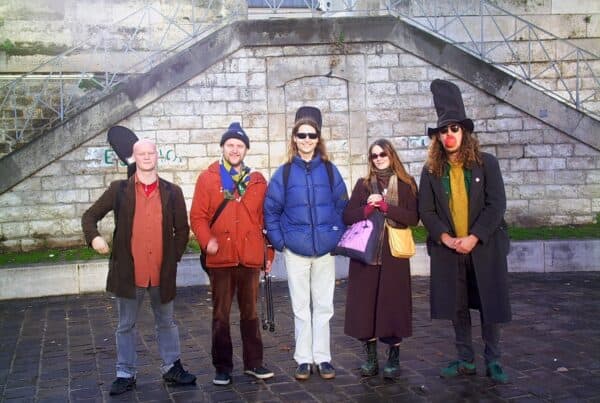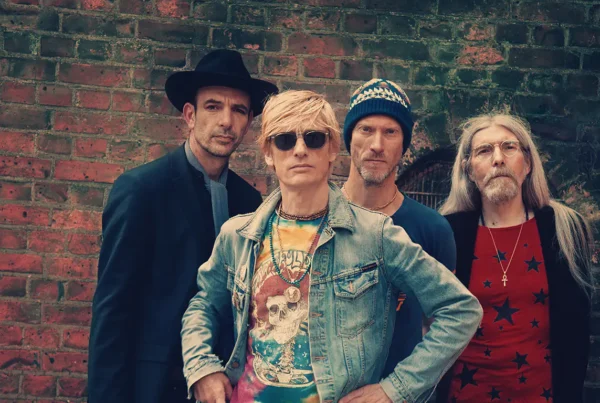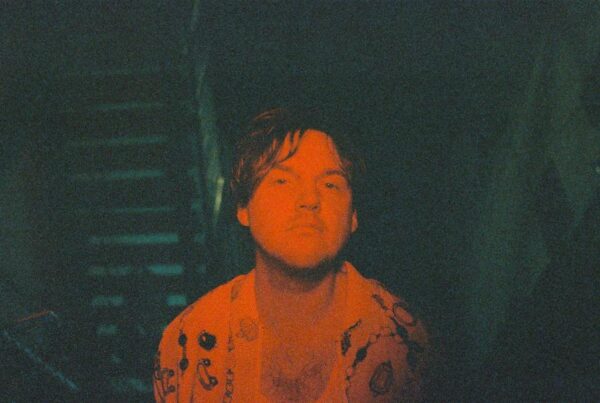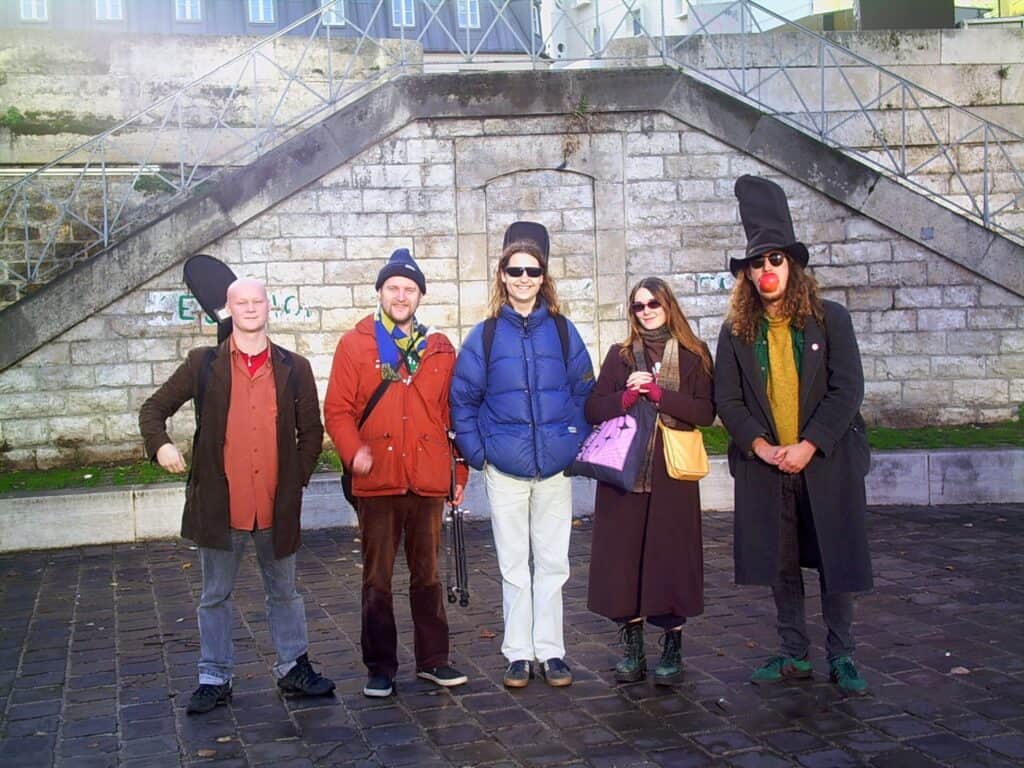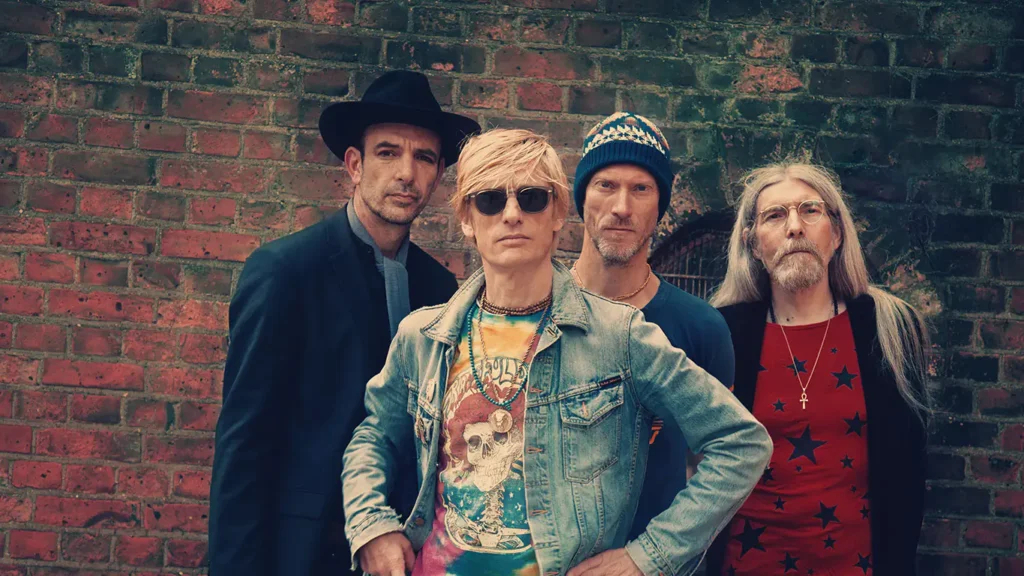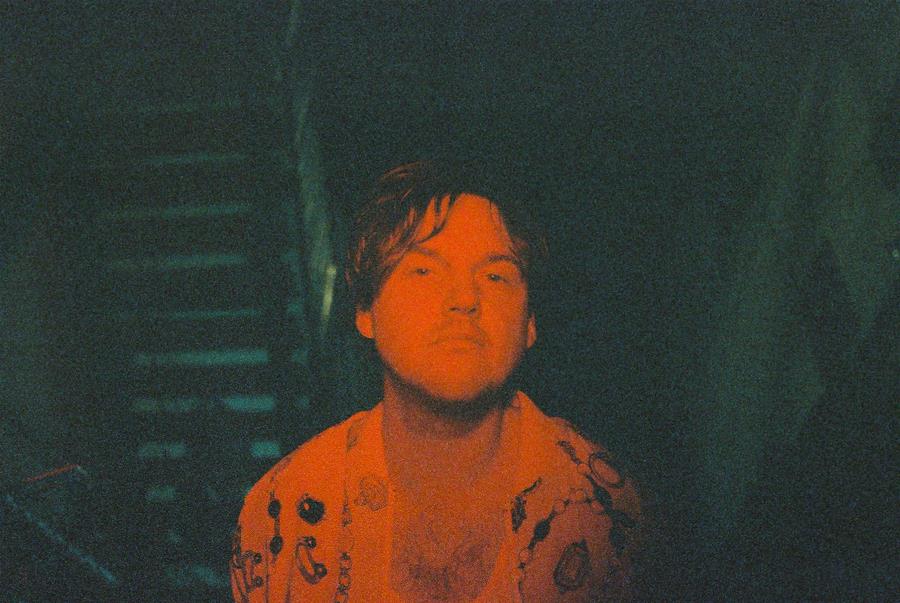March Violets is without question one of the most iconic goth bands of the last twenty years, and after much speculation they have returned with a new album and DV8 Festival appearance on the horizon. We speak to vocalist and founding member Simon Denbigh about the band’s past, present and future.

“I can’t understand how anyone could do better without me” – Simon Denbigh
S] As founding member of The March Violets – What led you to form the band? What was it about the music scene that inspired you to make music?
SD] “There are several reasons why people form bands: to be part of something, to make money, to pose, to get laid, to feel important and have their ego stroked. Whilst admitting to most of those, my main real drive was to create something new. I think that’s the basic urge, that releases the good endorphins when you do it and know that it is something that you did; born from you – unique.
It doesn’t even have to be seen or heard by others, just the act of creation is powerful. But of course you are always wanting the bonus buzz of a lot of other people going ‘that’s right, we totally agree’ to your creation. Acceptance and affirmation. There’s probably something deeply Freudian happening there. And the scene in Leeds in the late seventies and early eighties was inspiring, especially if you were a survivor of the punk years and liked the new bands coming through. There were great local bands like The Gang Of Four and the Mekons already established, and a whole host of brilliant new stuff from the likes of Soft Cell. There was a healthy nightclub circuit, playing Bowie, Bauhaus, Numan, DAF, Fad Gadget, The Stooges, the Dolls, Gun Club, Motorhead and more. And there were lots of seriously life-changing gigs to spark that creative urge: Joy Division, Magazine, Siouxsie. It all seemed obvious to me, why wouldn’t you want to be in a band?”
S] The March Violets enjoyed much success throughout the 80s, so where did it all go wrong do you think?
SD] “Which bit are you looking at? The Violets as a band?, the 80’s? or just my own personal doom? I got fed up of running at record labels, the rest of the band thought that they would do better without me. As my ego dictates, I can’t understand how anyone could do better without me.”
S] Many consider around 1981 and the two releases from Merciful Release Records (‘Religious As Hell’ and ‘Grooving In Green’ to be the birth of goth, what was it like at that time for an up-and-coming post-punk goth band from Leeds? Did you feel as though you were part of something larger or did it take you by surprise?
SD] “Well, many people might consider that to be the case, with hindsight. It’s easy to look back and neatly stick labels on stuff, that’s a natural human desire – to give it a name and fix it down, make it understandable and safe. In fact we were just a post-punk band from Leeds, trying hard not to be part of anything, trying to be different. Like a lot of others, we have been rationalised and tagged.
But at the time no-one had any master plan to create a special scene, except maybe the journalists. It was an organic development, with strange synchronicity, and a big adventure. That’s exactly the word, adventure. Setting out into the unknown with high hopes and self-belief and no map. And the bands born from round this area probably had that Northern sense of humour which is quite dark: Danse Society, Southern Death Cult, The Sisters of Mercy, The March Violets, Red Lorry Yellow Lorry. But if you listen to those bands properly you couldn’t say they sounded that similar. I can’t say that we felt part of anything larger other than the adventure itself, we were all-consuming and the largest thing in our lives. I wasn’t surprised that people seemed to like us, I had massive self-belief to the complete suspension of reality.”
S] Much of The March Violet’s music has quite dark themes, were they all inspired by personal experience or did you draw on wider influences?
SD] “All things, including personal experience, are open for inspiration. I like facts, and lies, and fantasy. And Poetry, and word power. Ideas often suggest other ideas, you don’t know where they come from, it is the fabulous power of the subconscious. Sometimes it is like being drunk on words. But I do like it to have meaning, often multiple meanings. I find Ambiguity attractive, and I like wit. And, I particularly like dark wit. I read a lot. I would suggest ‘Perfume’ by Patrick Suskind as a good book.”
S] How did you become interested in sword and armoury-forging and why?
SD] “My uncle John, who you will see in the ‘Dandelion King’ video, is a master swordsmith and armourer. I began helping him out making blades. I had to balance it with time spent on a career in music, and wouldn’t pretend to know more than a tiny bit of what my uncle knows. He has been doing it professionally for 40 years. I can remember making cannons with him when I was a kid, and shooting crossbows he had made. It is bloody hard work, a weird kind of mix between Art and Steel-working. We were one of the few British forges to make properly forged swords, mainly for the English Civil War re-enactment societies, but also for the Yorvik Centre and Leeds Royal Armouries. He really is the master, and can tell what is happening to metal in fire just by the colour. There is nothing quite like the feeling of holding a real forged sword, truly. It is hard to describe, dangerous yet appealing, you are surprised by the fact that you really want to use this razor sharp thing that only has one purpose!”
S] Where are your inspirations and influences for the new March Violets album and how do they compare with those of earlier works?
SD] “They are from all over. There do seem to be quite a lot of songs about death, maybe I am feeling my mortality. But there is also a fair amount of protest too. I feel very strongly about the unfairness of the rich and poor divide, in fact the whole band do. We have watched the richest people manipulate governments and steal billions, and generally engineer a world that is solely acting to maintain their lifestyle at the expense of everyone else. Five years ago the concept of ‘a billion’ was kind of rarely used, now it just drops off news readers tongues as though it’s nothing. A billion? Can anyone actually get their head round how much that is? And the political situation in the UK is back to where we were when the Violets formed. Only this time the Tories aren’t even feeling any embarrassment over their greed, it’s almost become acceptable. People actually rate others by how much they owe – the more the better, fu**ing outrageous. And the whole stinking financial sector has got itself into an unassailable position of control. They are thieves and gamblers with no remorse, and we have let them do it to us. It makes me angry and so I write songs.”
S] MV reappeared in 2007 for a reunion show and then disappeared again – why didn’t the band continue with a comeback then as opposed to waiting until 2010?
SD] “After the show, which was really only supposed to be a one-off, we did talk about more Violeting. We were offered lots of festivals. But Rosie developed throat cancer which is not good. Especially not good for a singer. Luckily Rosie battled through it and is clear now, but it was a very long and gruelling process for her. Now, we are having a go at doing something together again.”
S] What inspired the resurrection the MV in 2010 and what are the aspirations and motivations for the band today? And how have they changed from those of 1980 and 81?
SD] “It seemed like the right time to take the stage again, and was very well received, big thanks to all our fans who made the London show a great event. And that is kind of what we like to do – special events. Even the warm-up gigs for the festivals this summer are going to be good fun, and great value a free t-shirt, badge, gig and aftershow party for the price of a t-shirt! We do like to offer value for money for our fans. So I don’t think our aspirations and motivations have changed much, it’s still a big adventure, maybe with more of a map this time.”
S] The band launched the ‘Pledge For The March Violets’ campaign late last year – how successful has the campaign been in terms of raising the capital needed to produce the album? Is this a method you forsee becoming more popular in the future as bands move away from labels and manage themselves?
SD] “We hit our target, thanks to the fantastic support of the lovely folk who pledged. It is a great way to do things, and yes I could see it becoming a business model for the future. The whole music business is really turbulent and flaky at the moment. There is a lot of uncertainty, and ‘out with the old’ ideas. I like this, the major labels were always ripping everyone off – artists and fans alike.
Instead of embracing file sharing and the internet, they fought against it, and totally predictably lost and drove everyone into piracy. It’s a problem they caused, like all big greedy corporations it was like ‘the war on drugs’, doomed to failure and make things worse. Let’s have a revolution. And I say fine, download the songs and give them to your friends with love. But don’t forget us, the people making them, we need to be supported so if you like it buy it.”
S] With the exception of 2007’s limited edition ‘Trinity’ EP, how does it feel to be on the verge of releasing new material for the first time since 1985?
SD] “Exciting.”
S] How does it feel to be taking MV back on the road with headline appearances at European festivals as well as headlining at our very own city’s DV8 Festival.
SD] “Very exciting.”
S] What’s next for MV – another album, more shows or is this it again for now?
SD] “We won’t be doing tons of touring, we never did and that much hasn’t changed. So don’t be expecting that. Come and see us this summer. Then let’s see what is around the corner.”
For more information visit the official March Violets the ‘Pledge For The March Violets’ campaign.
You can download the new Violets’ track ‘Road Of Bones’ here.

